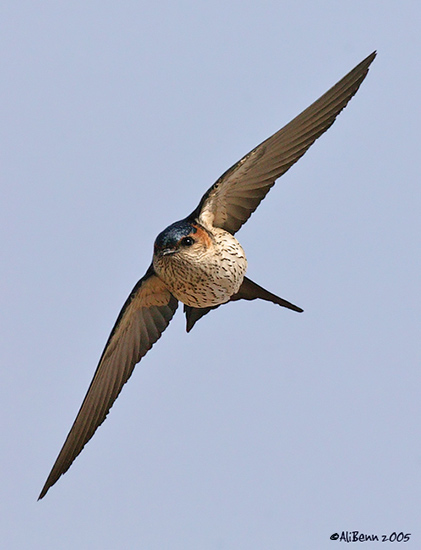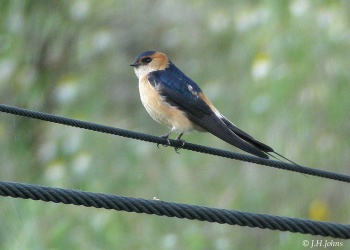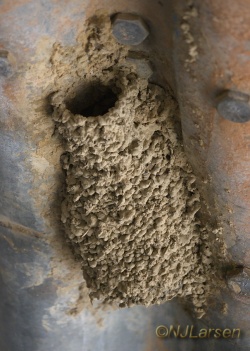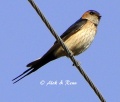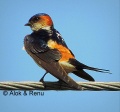- Cecropis daurica
Includes: West African Swallow
Hirundo daurica
Identification
16–17 cm (6¼-6¾ in)
Warm buff underparts that vary geographically from plain to quite strongly streaked (especially in northern China). Dark, glossy-blue upperparts, noticeably interrupted by chestnut nape and pale rufous rump. Black vent and undertail coverts is a prominent feature in Europe but is much reduced in birds from e.g., India.
Similar Species
Lacks the dark red face and breast band with sharp contrast to pale belly of Barn Swallow but instead has more black on the rear (vent is pale in Barn Swallow). Looks more thickset in flight which also gives impression of being slower. In area of overlap, Striated Swallow must also be considered.
Distribution
Portugal and Spain to Japan, Nepal, India and tropical Africa. At least northernmost populations are migratory, in winter ranges to Southern Africa and northern Australia.
Often occurs as vagrant north of breeding ranges, for example in Britain and Denmark.
Taxonomy
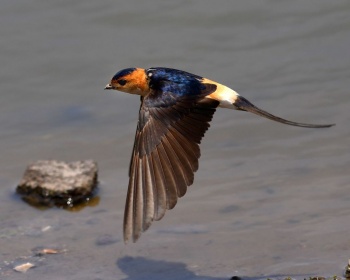
Photo © by waterrailus
Lesvos, May 2017
Previously included in genus Hirundo
Sri Lanka Swallow was formerly included in this species.
Subspecies
Nine[1] or ten subspecies are recognised.
- C. d. daurica
- C. d. japonica
- C. d. nipalensis
- C. d. erythropygia
- C. d. rufula
- Iberian Peninsula to North Africa, Iran, Afghanistan and north-western India
- C. d. domicella
- Senegambia to southern Sudan and extreme north-western Uganda
- C. d. kumboensis
- Sierra Leone (Birwa Plateau) and Cameroon (Bamenda highlands)
- C. d. emini
- Southeastern South Sudan and eastern Democratic Republic of the Congo south through Uganda and Kenya to Malawi and northern Zambia
- C. d. melanocrissus
- Highlands of Ethiopia
C. d. domicella from West Africa is sometimes split as West African Swallow,
Habitat
Plains, grassland, rocky outcrops.
Behaviour
Breeding
They build nests with a tunnel entrance lined with mud, 3-6 eggs are laid. They normally nest under sea or inland cliff overhangs, in caves, rock clefts or under bridges.
Diet
Their main diet consists mostly of insects such as flies, beetles, bugs, termites, grasshoppers and wasps.
Vocalisation
Song: A twittering warble
<flashmp3>Hirundo daurica (song).mp3</flashmp3>
Listen in an external program
Gallery
Click images to see larger version
Ssp. nipalensis
Photo © by Alok Tewari
Dwarahat, Uttarakhand Himalayas, 5200 ft. above MSL, India, April-2011Ssp. erythropygia
Photo © by Alok Tewari
Sultanpur, Dist. Gurgaon, Haryana, India, March-2014
References
- Clements, J. F., T. S. Schulenberg, M. J. Iliff, D. Roberson, T. A. Fredericks, B. L. Sullivan, and C. L. Wood. 2018. The eBird/Clements checklist of birds of the world: v2018. Downloaded from http://www.birds.cornell.edu/clementschecklist/download/
- BF Member observations
- Collins Field Guide 5th Edition
- Birdforum Id-forum thread discussing red-rumped swallow
- Birdforum Id-forum thread discussing red-rumped swallow
- Handbook of the Birds of the World Alive (retrieved January 2019)
Recommended Citation
- BirdForum Opus contributors. (2024) Red-rumped Swallow. In: BirdForum, the forum for wild birds and birding. Retrieved 6 May 2024 from https://www.birdforum.net/opus/Red-rumped_Swallow
External Links




